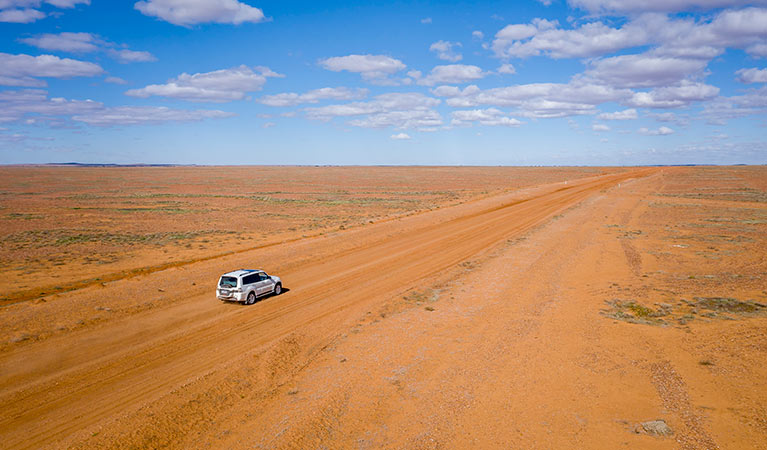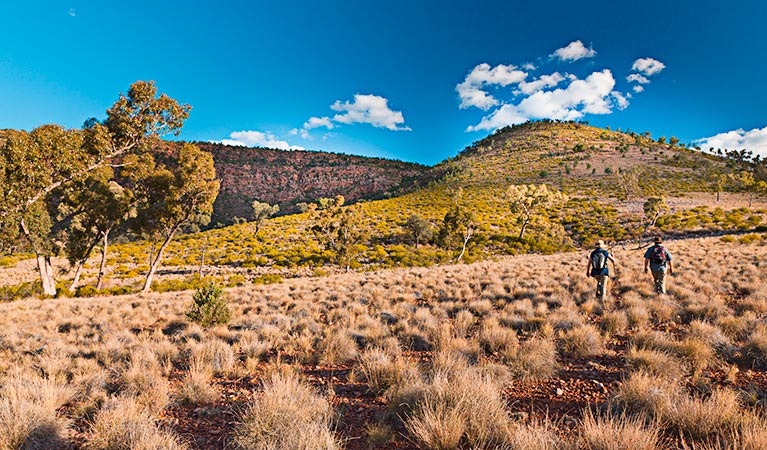Stay safe in Outback NSW
During your visit to Outback NSW, your safety is the highest priority. Outback NSW is a region of extreme temperatures, reaching up to 50°C in some places. Remember that the nights can be cold and temperatures can drop well below 0°C at times in winter. Autumn and spring are the best times for extended stays and long drives.
Read more about Stay safe in Outback NSW
Plan your drive
- Use maps to prepare your itinerary and take them with you.
- Don’t make your schedule too tight – allow for unexpected delays.
- Check the weather forecast before you go.
- Check for park alerts or closures before you go.
- Check road conditions before you go.
- Be prepared for unsealed roads that may be impassable after rain. Many outback roads are unsuitable for 2WD vehicles.
- Have your vehicle serviced before your journey.
- Consider getting NRMA roadside assistance before you go or call 13 11 22.
- Consider a pre-trip service inspection of your vehicle. If you're traveling remote, consider carrying extra fuel in a suitable fuel container, spare tyres and wheel changing equipment.
- Check the locations of local food and fuel supplies before you go.
- Avoid driving at sunrise and sunset. Many native animals are active at this time. You might also encounter livestock on the roadside at any time.
What to bring
This is not an extensive list. Some basic items to bring include:
- First aid kit.
- Water. 20 litres for emergency use and 4 litres per person per day.
- Communication equipment. Your mobile phone may not work in the outback.
- Food for all days of the trip and extra to cover unexpected delays.
- Fire extinguisher.
- Tool kit suitable for the vehicle and trailer if you're towing one including tyre changing equipment.
- Depending on your trip you may need 2 spare wheels.
- Recovery equipment if you plan to go off road.
- Shovel in case you get bogged.
- Compass or global positioning system (GPS).
- Tarpaulin or other shade device.
- Cooler or fridge.
- Rubbish bags.
- Matches or lighter.
Tell somebody
Give your route details to family and friends who are not travelling with you. Tell them when you expect to return and let them know when you have returned. For longer trips or remote areas, consider filling in a trip intention form and taking a personal locator beacon.
Safety apps for mobile phones
Please note, these apps only work when you have mobile reception. Download them before you go.
The Emergency Plus app will help you contact emergency services. It's a free app developed by Australia's emergency services and their Government and industry partners.
Use the Hazards Near Me app to check for bushfires in NSW before you go and during your trip, especially in summer.
If your vehicle breaks down
If for some reason your vehicle breaks down or gets stuck, stay with your vehicle. You are easier to find.
Be prepared for road closures
Roads in the Outback NSW region may need to be closed at times due to flooding. Before you travel, contact one of the local councils or traffic authorities below for information on road closures and road conditions.
Live traffic updates
Visit Live Traffic NSW for the most up to date traffic information for NSW.
Call the NSW Roads and Maritime Services 24-hour information line on 132 701.


